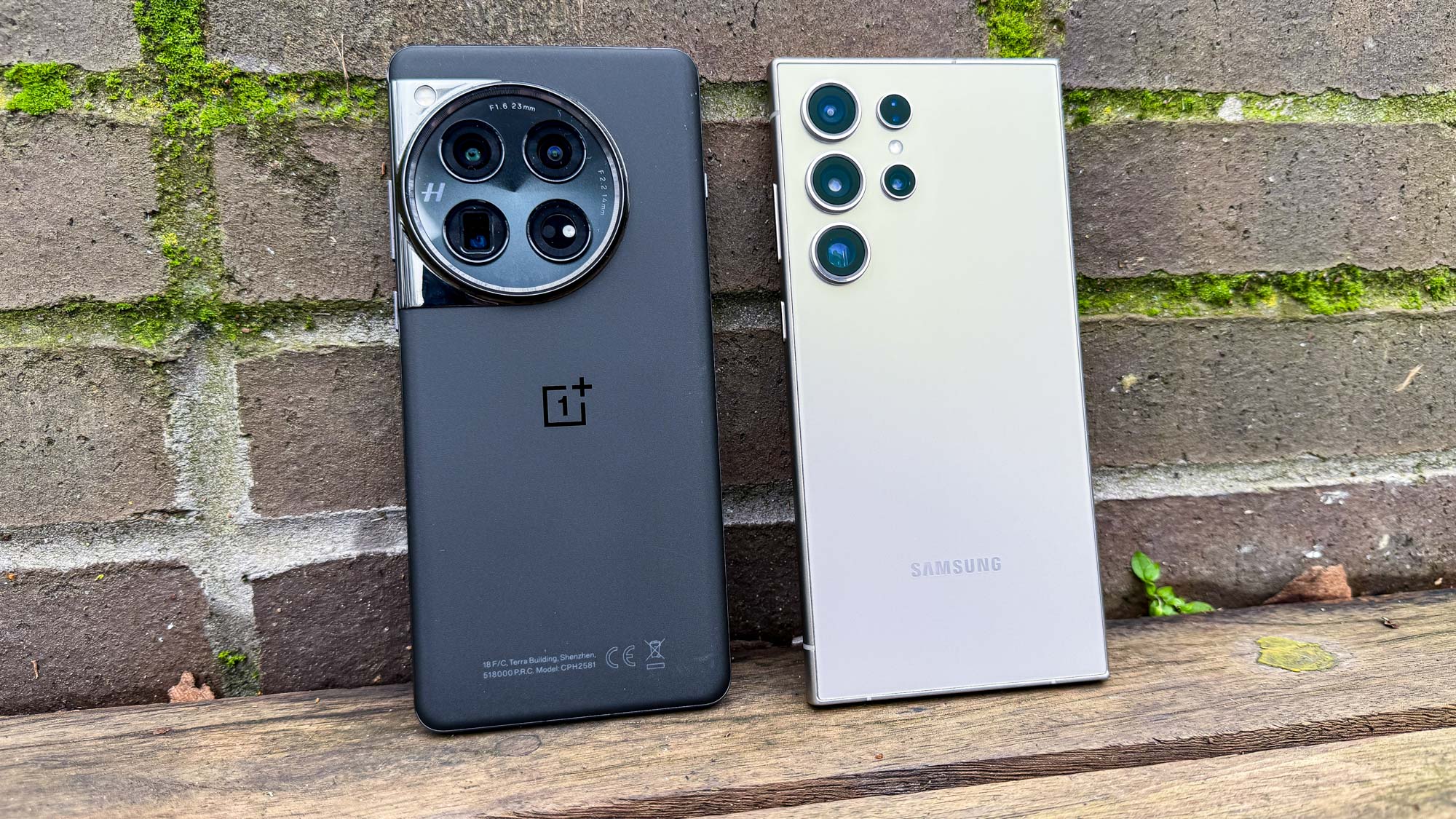
The OnePlus 12 and Samsung Galaxy S24 Ultra show us the two ends of the flagship Android phone spectrum. Both are some of the best phones you can buy today, but they have as much separating them as they have in common.
The newer OnePlus 12 aims to provide effective all-round performance, from its chipset to its charging speed to its camera quality, all for a competitive price. On the other hand we have the Samsung Galaxy S24 Ultra is instead trying to load everything you could reasonably expect on a modern phone, including dual telephoto cameras, a titanium body and the latest AI-powered features.
But taking all those features into account, judging their overall quality and value for money, which is the better phone? That's what we'll find out by the end of this article, so join us as we fire the starting gun for this OnePlus 12 vs. Samsung Galaxy S24 face-off.
OnePlus 12 vs. Samsung Galaxy S24 Ultra: Specs
OnePlus 12 vs. Samsung Galaxy S24 Ultra: Price and availability
Available to buy since February 6, the OnePlus 12 starts at $799. The Samsung Galaxy S24 Ultra, which went on sale on January 31, is more expensive at $1,299. That's a significant difference when you see how many similarities these phones have as we go through this face-off. In fact, despite rivaling Samsung's Ultra model, the OnePlus 12 goes for the same price as the smaller and less generously specced Galaxy S24 base model.
Winner: OnePlus 12
OnePlus 12 vs. Samsung Galaxy S24 Ultra: Design
Whether it's the front, back or sides you're looking at, there are some obvious visual differences between the OnePlus 12 and the Samsung Galaxy S24 Ultra.
Starting with the OnePlus 12, we have a classic rounded rectangular design, featuring glossy aluminum sides and a back panel dominated by a big round camera block. The Galaxy S24 Ultra on the other hand has sharper corners, individually mounted rear cameras and titanium sides with a satin finish.
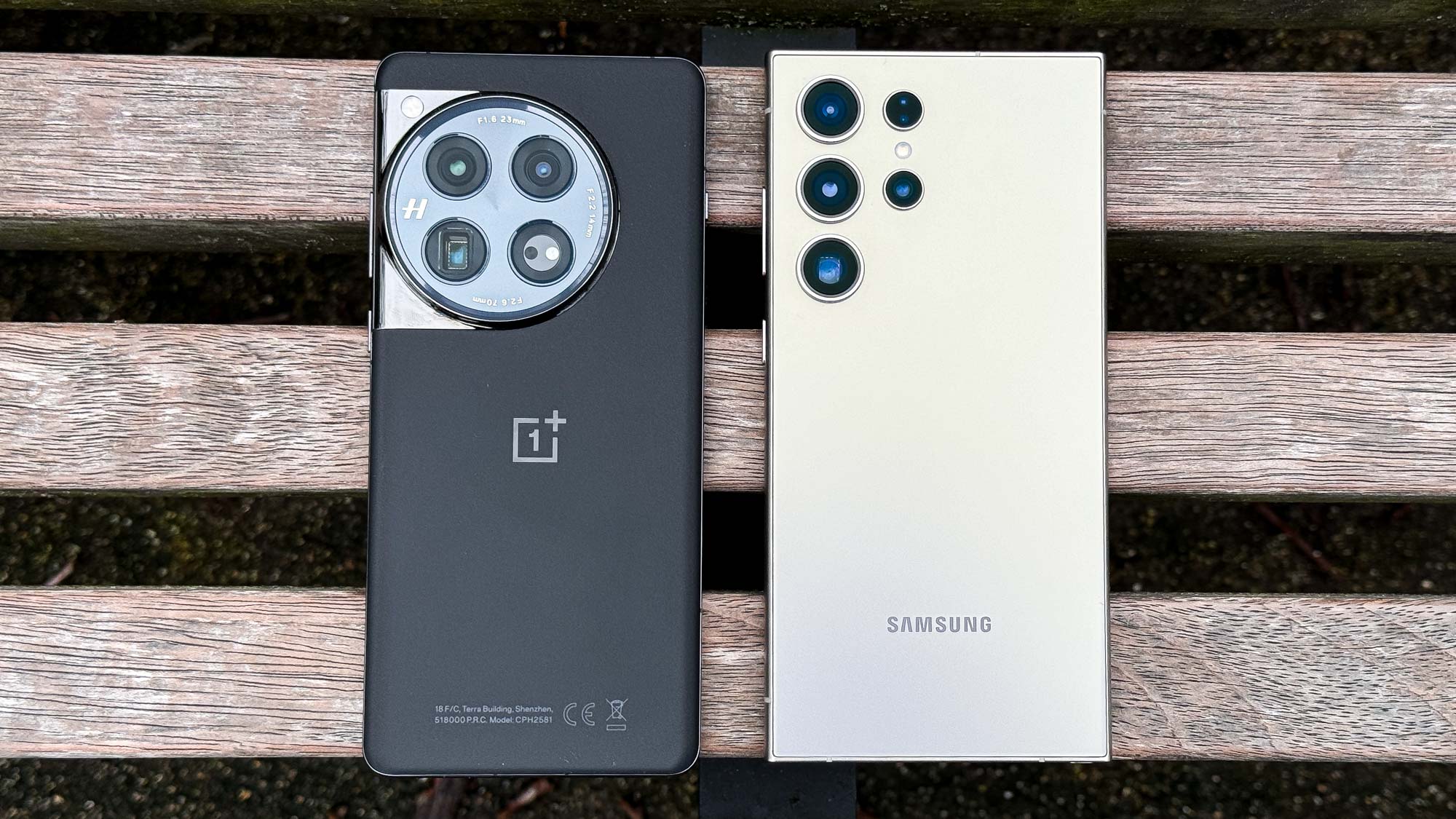
When you actually pick up the phones, you'll see that while they feel different to hold, they're actually very similar in size to one another. The OnePlus 12 is the lighter of the two, but only by less than half an ounce.
The OnePlus 12 has an IP65 rating for water resistance, but the Galaxy S24 Ultra has a superior IP68 rating, meaning it should be more resilient if the worst happens.
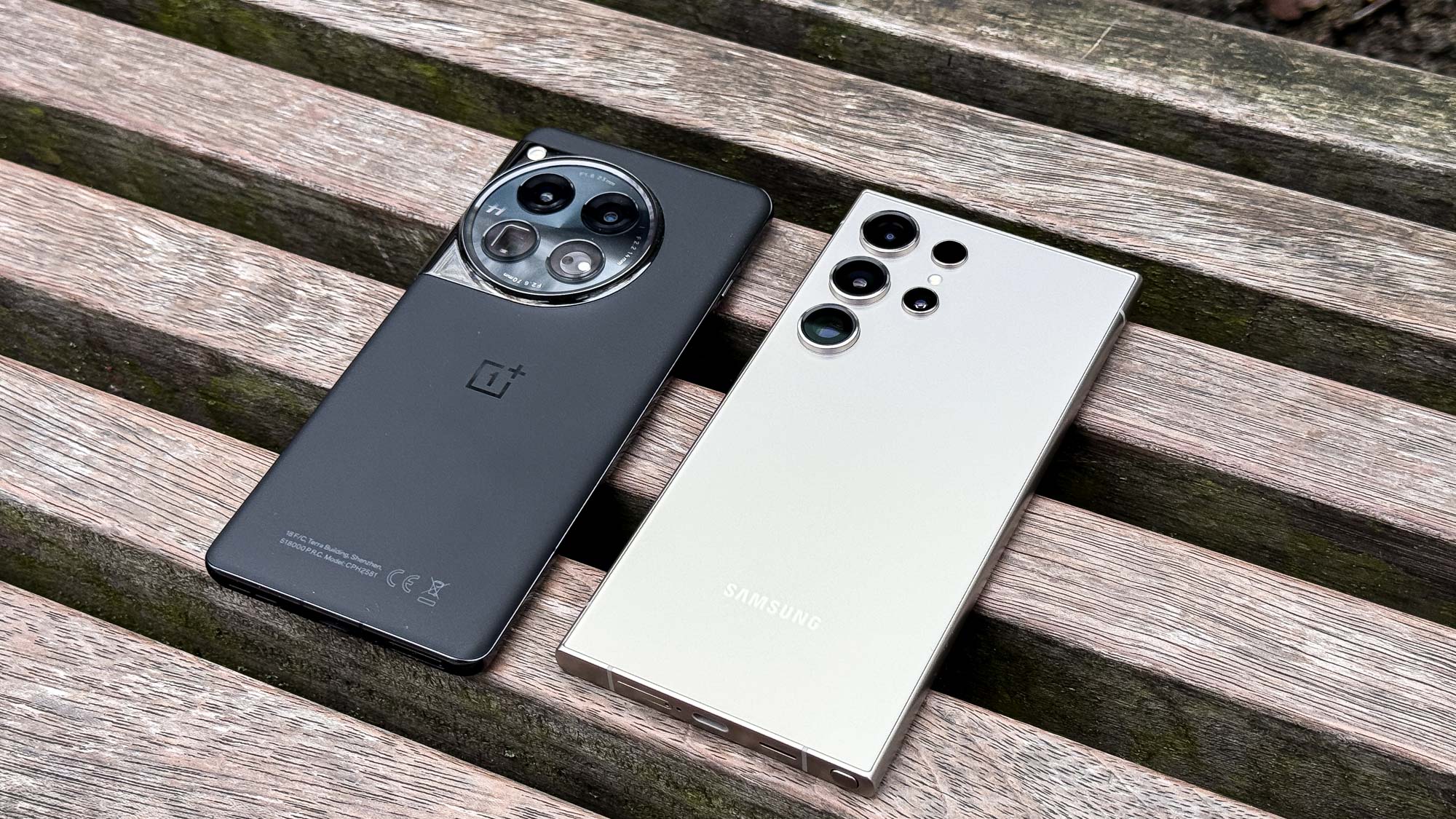
OnePlus offers the 12 in just two colors: Flowy Emerald and Silky Black. Samsung offers a wider variety for the Galaxy S24 Ultra, with the basic quartet being Titanium Black, Titanium Yellow, Titanium Gray and Titanium Violet. Samsung's own stores sell another three exclusive color options: Titanium Orange, Titanium Green and Titanium Blue.
Winner: Samsung Galaxy S24 Ultra
OnePlus 12 vs. Samsung Galaxy S24 Ultra: Display
These two phones both use 6.8-inch OLED displays with QHD resolutions and 1 - 120Hz adaptive refresh rates. But differences can be found if you go beyond the specs.
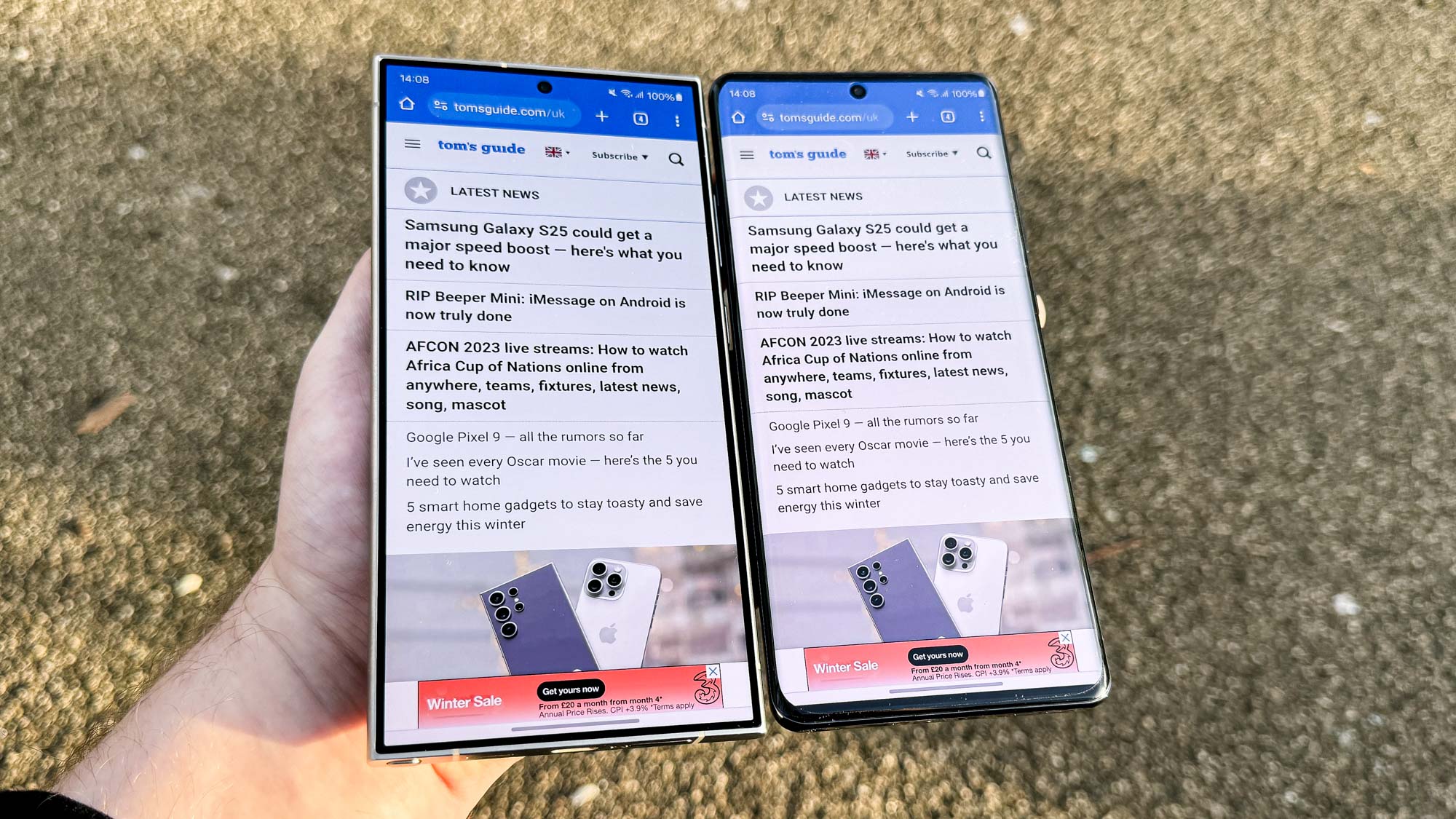
In our lab testing, the OnePlus proved to have a slightly more color-accurate display, but the Samsung provided a higher color gamut coverage and higher peak brightness.
That's odd when you consider the advertised max brightness levels for the OnePlus 12 and Galaxy S24 Ultra are 4,500 nits and 2,500 nits respectively, but this shows how a manufacturer's own lab tests don't always translate to more realistic forms of testing.
Using it myself, I could really see the benefit of the Galaxy S24 Ultra's anti-glare screen tech when in bright sunlight. The OnePlus 12's display did seem the brighter phone outside of the lab, but that didn't make as much a difference to my experience as the minimized reflections on the Samsung.
Winner: Samsung Galaxy S24 Ultra
OnePlus 12 vs. Samsung Galaxy S24 Ultra: Cameras
These two phones have quite different camera loadouts. The OnePlus 12 is fitted with 50MP main, 48MP ultrawide, 64MP 3x telephoto and 32MP selfie cameras, underpinned by photo processing system developed with camera maker Hasselblad. The Galaxy S24 Ultra meanwhile uses 200MP main, 12MP ultrawide, 10MP 3x telephoto, 50MP 5x telephoto and 12MP selfie cameras giving it a sensor count, resolution and range advantage on paper.
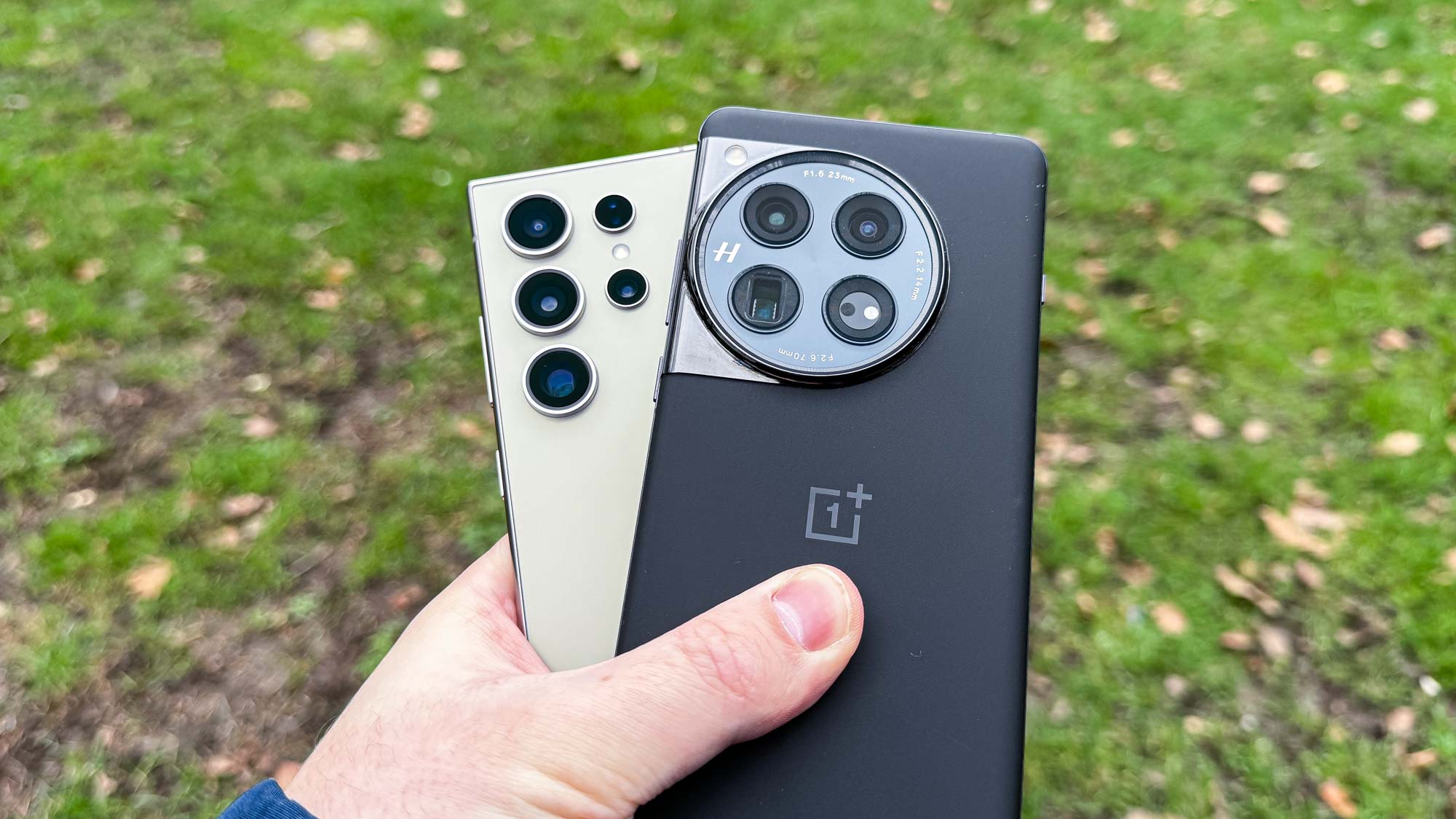
But let's see how this pans out in testing. First up, main shots of a small bandstand-like shelter in a park. The Samsung image is more saturated, while the OnePlus' is more neutral. Up close, the Galaxy's additional brightness helped bring out more of the textural detail that the OnePlus isn't able to show, although you're unlikely to be zooming in at this level most of the time.
The ultrawide comparison flips this around. The Galaxy S24's image is surprisingly cool compared to the OnePlus', perhaps due to the dramatic difference in resolution between the sensors in this case. But since the OnePlus is still shooting at 12MP resolution via pixel-binning, there's actually very little difference in detail between the two photos.
At 3x zoom, where both phones can use optical magnification, there's again a noticeable color temperature difference between the warm OnePlus and cold Galaxy. OnePlus has a resolution advantage, but because it's pixel-binning its shots, the Samsung shot still has more definition when you zoom in further on this town sign.
We now move to 5x, where the Samsung has an immediate advantage with its dedicated second telephoto camera. The color temperature difference remains, but the Galaxy S24's image is far sharper than the OnePlus, which has to rely on its 3x camera plus some digital zoom to match the performance.
Last of all, a selfie in portrait mode. The OnePlus has produced a brighter shot, but the Samsung offers a bit more detail in my sweater despite having a lower-resolution image. The Galaxy does a better cut-out around my glasses for its bokeh effect too.
You can take some fabulous shots with the OnePlus 12, its cameras undoubtely flagship-worthy. But the Samsung Galaxy S24 Ultra's extra camera and better processing earns it a win here.
Winner: Samsung Galaxy S24 Ultra
OnePlus 12 vs. Samsung Galaxy S24 Ultra: Performance
Our two competitors both use the Snapdragon 8 Gen 3 chipset, although the Samsung Galaxy S24 Ultra uses a customized "For Galaxy" edition while the OnePlus 12 uses the basic version. The other key performance spec is RAM - you get 12GB RAM in all Galaxy S24 Ultra models, while there's 12GB in the base OnePlus 12 but 16GB in its top model.
The Galaxy S24 Ultra managed higher CPU results on the Geekbench 6 benchmark and a faster transcoding time on our Adobe Premiere Rush test, but the OnePlus 12 fared slightly better than the Samsung on the 3DMark Wild Life Extreme Unlimited GPU benchmark.
To house your apps, photos and other data, both phones offer a default 256GB storage capacity, as well as the option to upgrade to 512GB. The Galaxy S24 Ultra boasts a 1TB version too as well if you need as much room as possible.
Winner: Samsung Galaxy S24 Ultra
OnePlus 12 vs. Samsung Galaxy S24 Ultra: Battery and charging
Samsung equipped the Galaxy S24 Ultra with a large 5,000 mAh battery, but there's 5,400 mAh of capacity in the OnePlus 12. Between that and other optimizations, the OnePlus 12 lasts almost an hour longer than the Galaxy S24 Ultra, though the Galaxy's result is nothing to be sniffed at, and still earns it a spot on our best phone battery life page.
Charging speeds are a OnePlus specialty, so even though the Galaxy S24 Ultra offers reasonable 45W wired and 20W wireless charging speeds, the OnePlus 12 beats it with 80W wired charging (or 100W if you're outside the U.S.) and 50W wireless charging. As a result, the OnePlus fully charges in half an hour, while the Galaxy S24 Ultra reached a respectable 71% from empty in the same time.
Winner: OnePlus 12
OnePlus 12 vs. Samsung Galaxy S24 Ultra: Software and special features
Our two competitors both run Android 14: One UI 6 in the Samsung's case and OxygenOS 14.0 for the OnePlus. This means the two phones share a lot of features, though there are still plenty of more unique ones to point to.
For instance, the Galaxy S24 Ultra offers a lot of AI features, helping you with everything from translating calls in real time to editing photos to formatting your notes. OnePlus hasn't gone AI-mad, instead focusing on more conventional features like a widget shelf accessible with a swipe down from the top right corner, or Zen Mode which locks you out of certain specified apps for an amount of time to force you to relax. AI-powered Magic Compose and Emojify features should be appearing on the OnePlus 12 in the near future, if OnePlus lives up to what it promised during the phone's announcement.
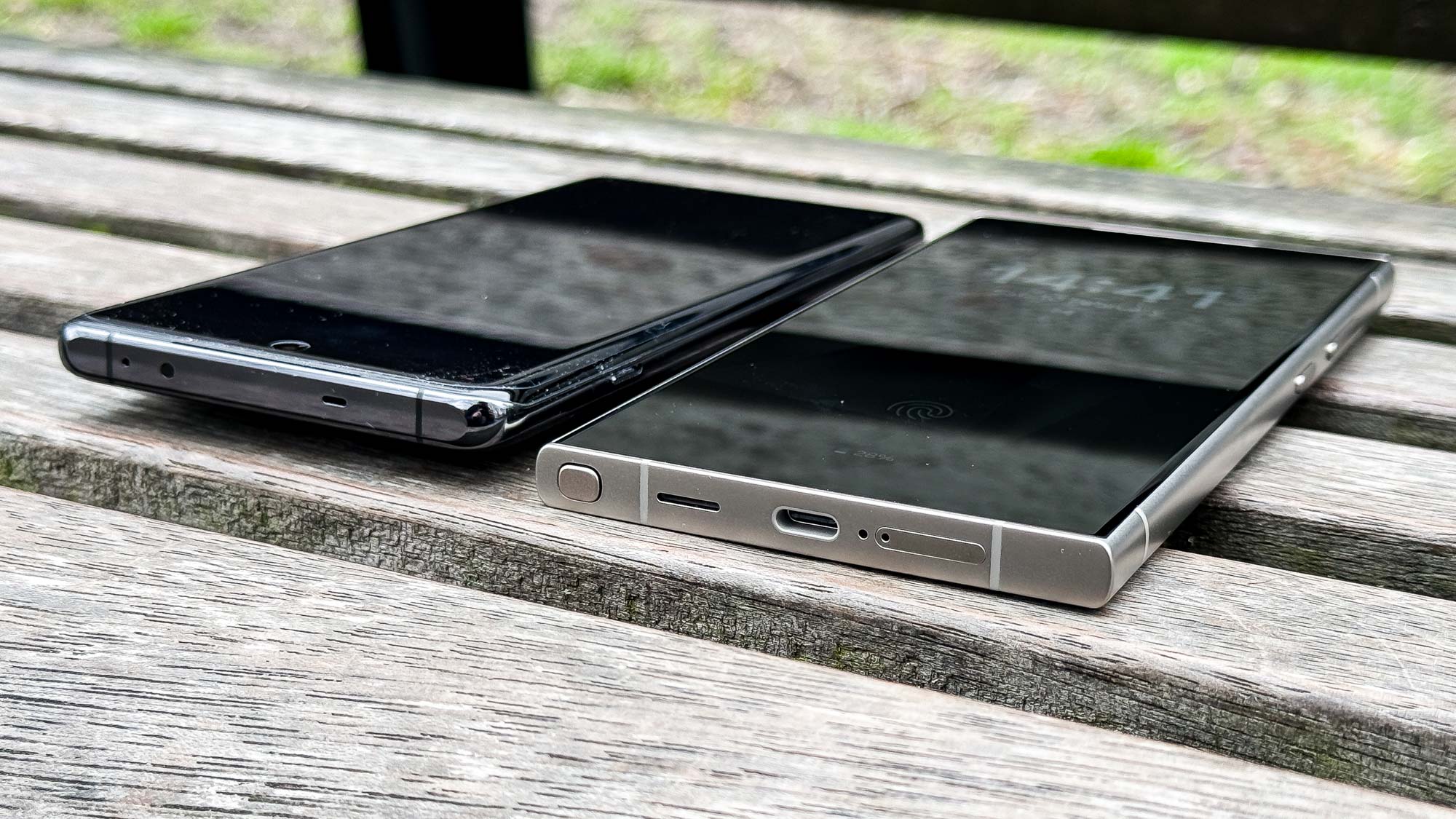
Beyond software, the OnePlus 12 also offers an IR blaster on its top edge. With a little set-up you can use the phone as a universal remote for things like air conditioners and TVs, which could prove very useful depending on how much compatible tech you have in your home.
The Galaxy S24 Ultra meanwhile features an S Pen stylus, stowed in a silo on the bottom edge. This can be used to navigate the phone normally with swipes and taps, but is also a highly responsive and versatile way of drawing or taking notes.
OnePlus has pledged to provide the OnePlus 12 with four years of Android upgrades and five years of security upgrades, whereas Samsung is offering seven years of both for the Galaxy S24 Ultra. While the Galaxy will in theory last you longer as a result, as OnePlus told us in an exclusive interview, it makes efforts to guarantee its phones will still work well after years of use, which Samsung apparently does not.
Winner: Samsung Galaxy S24 Ultra
OnePlus 12 vs. Samsung Galaxy S24 Ultra: Verdict
Totaling up the scores below, it's not a surprise to see a Galaxy S24 Ultra victory, but we have to also acknowledge that the OnePlus 12 isn't far behind despite costing less than two thirds as much as the Samsung.
The OnePlus 12's two outright victories in this comparison are for its lower price and its longer-lasting battery and faster charging abilities. Its weakest points in comparison to the Galaxy S24 Ultra meanwhile are photography, a traditional area Samsung has done very well, and software and features, which Samsung has newly focused on with the Galaxy S24 series.
In a pure point-to-dollar ratio, the OnePlus 12 comes off far better, which is perhaps all some users need to know. But anyone wanting the best in Android phones right now may have to accept there's no better option than the Galaxy S24 Ultra, even at that price.







